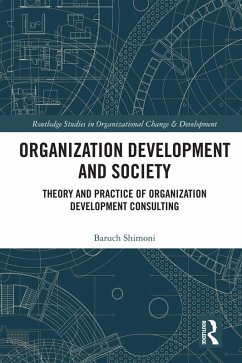Baruch Shimoni
Organization Development and Society (eBook, ePUB)
Theory and Practice of Organization Development Consulting
41,95 €
41,95 €
inkl. MwSt.
Sofort per Download lieferbar

21 °P sammeln
41,95 €
Als Download kaufen

41,95 €
inkl. MwSt.
Sofort per Download lieferbar

21 °P sammeln
Jetzt verschenken
Alle Infos zum eBook verschenken
41,95 €
inkl. MwSt.
Sofort per Download lieferbar
Alle Infos zum eBook verschenken

21 °P sammeln
Baruch Shimoni
Organization Development and Society (eBook, ePUB)
Theory and Practice of Organization Development Consulting
- Format: ePub
- Merkliste
- Auf die Merkliste
- Bewerten Bewerten
- Teilen
- Produkt teilen
- Produkterinnerung
- Produkterinnerung

Bitte loggen Sie sich zunächst in Ihr Kundenkonto ein oder registrieren Sie sich bei
bücher.de, um das eBook-Abo tolino select nutzen zu können.
Hier können Sie sich einloggen
Hier können Sie sich einloggen
Sie sind bereits eingeloggt. Klicken Sie auf 2. tolino select Abo, um fortzufahren.

Bitte loggen Sie sich zunächst in Ihr Kundenkonto ein oder registrieren Sie sich bei bücher.de, um das eBook-Abo tolino select nutzen zu können.
This book offers a new approach for the practice of organization development. The new approach sees consultees' thinking and behavior a result of habitus.
- Geräte: eReader
- mit Kopierschutz
- eBook Hilfe
- Größe: 2.05MB
Andere Kunden interessierten sich auch für
![Philosophy and Organization (eBook, ePUB) Philosophy and Organization (eBook, ePUB)]() Philosophy and Organization (eBook, ePUB)52,95 €
Philosophy and Organization (eBook, ePUB)52,95 €![Gender, Embodiment and Fluidity in Organization and Management (eBook, ePUB) Gender, Embodiment and Fluidity in Organization and Management (eBook, ePUB)]() Gender, Embodiment and Fluidity in Organization and Management (eBook, ePUB)20,95 €
Gender, Embodiment and Fluidity in Organization and Management (eBook, ePUB)20,95 €![Liminality in Organization Studies (eBook, ePUB) Liminality in Organization Studies (eBook, ePUB)]() Maria Rita TagliaventiLiminality in Organization Studies (eBook, ePUB)20,95 €
Maria Rita TagliaventiLiminality in Organization Studies (eBook, ePUB)20,95 €![Visual and Multimodal Research in Organization and Management Studies (eBook, ePUB) Visual and Multimodal Research in Organization and Management Studies (eBook, ePUB)]() Markus HöllererVisual and Multimodal Research in Organization and Management Studies (eBook, ePUB)43,95 €
Markus HöllererVisual and Multimodal Research in Organization and Management Studies (eBook, ePUB)43,95 €![Beyond Rationality in Organization and Management (eBook, ePUB) Beyond Rationality in Organization and Management (eBook, ePUB)]() Beyond Rationality in Organization and Management (eBook, ePUB)20,95 €
Beyond Rationality in Organization and Management (eBook, ePUB)20,95 €![Diversity (eBook, ePUB) Diversity (eBook, ePUB)]() Mustafa F. OzbilginDiversity (eBook, ePUB)37,95 €
Mustafa F. OzbilginDiversity (eBook, ePUB)37,95 €![Management, Organizations and Contemporary Social Theory (eBook, ePUB) Management, Organizations and Contemporary Social Theory (eBook, ePUB)]() Management, Organizations and Contemporary Social Theory (eBook, ePUB)37,95 €
Management, Organizations and Contemporary Social Theory (eBook, ePUB)37,95 €-
-
-
This book offers a new approach for the practice of organization development. The new approach sees consultees' thinking and behavior a result of habitus.
Dieser Download kann aus rechtlichen Gründen nur mit Rechnungsadresse in A, B, BG, CY, CZ, D, DK, EW, E, FIN, F, GR, HR, H, IRL, I, LT, L, LR, M, NL, PL, P, R, S, SLO, SK ausgeliefert werden.
Produktdetails
- Produktdetails
- Verlag: Taylor & Francis eBooks
- Seitenzahl: 140
- Erscheinungstermin: 11. März 2019
- Englisch
- ISBN-13: 9781351264822
- Artikelnr.: 55711776
- Verlag: Taylor & Francis eBooks
- Seitenzahl: 140
- Erscheinungstermin: 11. März 2019
- Englisch
- ISBN-13: 9781351264822
- Artikelnr.: 55711776
- Herstellerkennzeichnung Die Herstellerinformationen sind derzeit nicht verfügbar.
Baruch Shimoni is a professor of sociology and organization development at Bar-Ilan University Israel. He has a Ph.D. from the Hebrew University of Jerusalem. During his Ph.D. studies, he spent a year (1999-2000) at Sloan School of Management at MIT. In the 2003-2005, he had a post-doctoral fellowship at the Department of Anthropology at Yale University. In the course of the last 25 years, he has developed a professional career that integrates academic research with practical consulting to organizations. His challenge has been to both enhance his practical engagement with the most current research and theoretical insights and to use this practical engagement for the development of theory in the OD field. In addition to research and teaching, he founded and now serves as the academic head of the M.A. program in Organization Development and consults with organizations outside the university. In his most recent research project, Professor Shimoni uses the concept of habitus to theoretically and practically understand and cope with processes of change and development. Specifically, he links the Bourdieuan concept of habitus to the field of OD and in so doing provides an alternative way to incorporate the individual and the social in OD.
List of Tables
Acknowledgments
Chapter 1 Introduction
* The book's argument
* A first glance on the concept of habitus
* The book's goals
* The habitus-oriented OD (HOOD) as a helping profession
* HOOD's dual perspective
* Wedding of Organization Development (OD) and Critical Management
Studies (CMS)
* Who are the readers of the book?
* What is not in the book?
* A few words about methodology
* The book's chapters
Chapter 2 A short Overview of the OD Field
* 1940s-1950s: Kurt Lewin and OD's ideological, theoretical and
practical foundations
* 1960s: The psychologists' era and the individualistic orientation
* 1970s-1980s: The structural orientation and the consultants' era
* 1990s-2000s: The scholar-practitioners' era and the postmodern
constructionist orientation
* HOOD vs. Appreciative Inquiry and Dialogic OD
Chapter 3 Taking Bourdieu to Practice: Toward a Habitus-Oriented OD (HOOD)
* Agent Structure theories and the need for the concept of habitus
* Habitus as a site in which structure and practice meet
* Notes on the epistemological roots of Bourdieu's theory of action
* The self as a source of thinking and behavior
* The habitus as a source of thinking and behavior
* The hysteresis effect
* Capital and position
* Field
* Strategies and the field's doxa
* Symbolic violence
* Social equilibrium and relational theory of practice
Chapter 4 Organization Development and Society
Individualism, blame and control
* Managerialism
* OD's humanistic values
* OD's Managerialist perspective
* Back to OD's big dilemma: Moral and effective consultancy
OD as a bridge between organizations and society
* Macro emancipation
* Micro emancipation
Chapter 5 HOOD and Resistance to Change (RTC)
* The chapter's argument and goal
* RTC and the individual
* RTC and social context
* RTC and social construction
* Case study: Kimono
* RTC and HOOD
Chapter 6 HOOD in Action
* The chapter's argument and goal
* Case study: the surgery department
* HOOD: problem solving and change
Chapter 7 HOOD's Objectives in OD Change Processes
* Habitus and social continuity
* Habitus and social change
* HOOD's objectives
* HOOD in OD practices
Chapter 8 Concluding discussion
* Overcoming the personal-social dichotomy
* Moral and effective consulting
* Criticizing managerialism is not anti-manager
* HOOD as a bridge between organizations and society
* Empowerment, emancipations and social structure
* The skills required to operate in accordance with HOOD
Chapter 9 Summary and future research
* Why habitus-oriented OD and not self-oriented OD?
* Why habitus-oriented OD and not culture-oriented OD?
* Criticism and the duty to offer an alternative practical approach
* HOOD in other social fields
* Future research
Author Biography
Index
Acknowledgments
Chapter 1 Introduction
* The book's argument
* A first glance on the concept of habitus
* The book's goals
* The habitus-oriented OD (HOOD) as a helping profession
* HOOD's dual perspective
* Wedding of Organization Development (OD) and Critical Management
Studies (CMS)
* Who are the readers of the book?
* What is not in the book?
* A few words about methodology
* The book's chapters
Chapter 2 A short Overview of the OD Field
* 1940s-1950s: Kurt Lewin and OD's ideological, theoretical and
practical foundations
* 1960s: The psychologists' era and the individualistic orientation
* 1970s-1980s: The structural orientation and the consultants' era
* 1990s-2000s: The scholar-practitioners' era and the postmodern
constructionist orientation
* HOOD vs. Appreciative Inquiry and Dialogic OD
Chapter 3 Taking Bourdieu to Practice: Toward a Habitus-Oriented OD (HOOD)
* Agent Structure theories and the need for the concept of habitus
* Habitus as a site in which structure and practice meet
* Notes on the epistemological roots of Bourdieu's theory of action
* The self as a source of thinking and behavior
* The habitus as a source of thinking and behavior
* The hysteresis effect
* Capital and position
* Field
* Strategies and the field's doxa
* Symbolic violence
* Social equilibrium and relational theory of practice
Chapter 4 Organization Development and Society
Individualism, blame and control
* Managerialism
* OD's humanistic values
* OD's Managerialist perspective
* Back to OD's big dilemma: Moral and effective consultancy
OD as a bridge between organizations and society
* Macro emancipation
* Micro emancipation
Chapter 5 HOOD and Resistance to Change (RTC)
* The chapter's argument and goal
* RTC and the individual
* RTC and social context
* RTC and social construction
* Case study: Kimono
* RTC and HOOD
Chapter 6 HOOD in Action
* The chapter's argument and goal
* Case study: the surgery department
* HOOD: problem solving and change
Chapter 7 HOOD's Objectives in OD Change Processes
* Habitus and social continuity
* Habitus and social change
* HOOD's objectives
* HOOD in OD practices
Chapter 8 Concluding discussion
* Overcoming the personal-social dichotomy
* Moral and effective consulting
* Criticizing managerialism is not anti-manager
* HOOD as a bridge between organizations and society
* Empowerment, emancipations and social structure
* The skills required to operate in accordance with HOOD
Chapter 9 Summary and future research
* Why habitus-oriented OD and not self-oriented OD?
* Why habitus-oriented OD and not culture-oriented OD?
* Criticism and the duty to offer an alternative practical approach
* HOOD in other social fields
* Future research
Author Biography
Index
List of Tables
Acknowledgments
Chapter 1 Introduction
* The book's argument
* A first glance on the concept of habitus
* The book's goals
* The habitus-oriented OD (HOOD) as a helping profession
* HOOD's dual perspective
* Wedding of Organization Development (OD) and Critical Management
Studies (CMS)
* Who are the readers of the book?
* What is not in the book?
* A few words about methodology
* The book's chapters
Chapter 2 A short Overview of the OD Field
* 1940s-1950s: Kurt Lewin and OD's ideological, theoretical and
practical foundations
* 1960s: The psychologists' era and the individualistic orientation
* 1970s-1980s: The structural orientation and the consultants' era
* 1990s-2000s: The scholar-practitioners' era and the postmodern
constructionist orientation
* HOOD vs. Appreciative Inquiry and Dialogic OD
Chapter 3 Taking Bourdieu to Practice: Toward a Habitus-Oriented OD (HOOD)
* Agent Structure theories and the need for the concept of habitus
* Habitus as a site in which structure and practice meet
* Notes on the epistemological roots of Bourdieu's theory of action
* The self as a source of thinking and behavior
* The habitus as a source of thinking and behavior
* The hysteresis effect
* Capital and position
* Field
* Strategies and the field's doxa
* Symbolic violence
* Social equilibrium and relational theory of practice
Chapter 4 Organization Development and Society
Individualism, blame and control
* Managerialism
* OD's humanistic values
* OD's Managerialist perspective
* Back to OD's big dilemma: Moral and effective consultancy
OD as a bridge between organizations and society
* Macro emancipation
* Micro emancipation
Chapter 5 HOOD and Resistance to Change (RTC)
* The chapter's argument and goal
* RTC and the individual
* RTC and social context
* RTC and social construction
* Case study: Kimono
* RTC and HOOD
Chapter 6 HOOD in Action
* The chapter's argument and goal
* Case study: the surgery department
* HOOD: problem solving and change
Chapter 7 HOOD's Objectives in OD Change Processes
* Habitus and social continuity
* Habitus and social change
* HOOD's objectives
* HOOD in OD practices
Chapter 8 Concluding discussion
* Overcoming the personal-social dichotomy
* Moral and effective consulting
* Criticizing managerialism is not anti-manager
* HOOD as a bridge between organizations and society
* Empowerment, emancipations and social structure
* The skills required to operate in accordance with HOOD
Chapter 9 Summary and future research
* Why habitus-oriented OD and not self-oriented OD?
* Why habitus-oriented OD and not culture-oriented OD?
* Criticism and the duty to offer an alternative practical approach
* HOOD in other social fields
* Future research
Author Biography
Index
Acknowledgments
Chapter 1 Introduction
* The book's argument
* A first glance on the concept of habitus
* The book's goals
* The habitus-oriented OD (HOOD) as a helping profession
* HOOD's dual perspective
* Wedding of Organization Development (OD) and Critical Management
Studies (CMS)
* Who are the readers of the book?
* What is not in the book?
* A few words about methodology
* The book's chapters
Chapter 2 A short Overview of the OD Field
* 1940s-1950s: Kurt Lewin and OD's ideological, theoretical and
practical foundations
* 1960s: The psychologists' era and the individualistic orientation
* 1970s-1980s: The structural orientation and the consultants' era
* 1990s-2000s: The scholar-practitioners' era and the postmodern
constructionist orientation
* HOOD vs. Appreciative Inquiry and Dialogic OD
Chapter 3 Taking Bourdieu to Practice: Toward a Habitus-Oriented OD (HOOD)
* Agent Structure theories and the need for the concept of habitus
* Habitus as a site in which structure and practice meet
* Notes on the epistemological roots of Bourdieu's theory of action
* The self as a source of thinking and behavior
* The habitus as a source of thinking and behavior
* The hysteresis effect
* Capital and position
* Field
* Strategies and the field's doxa
* Symbolic violence
* Social equilibrium and relational theory of practice
Chapter 4 Organization Development and Society
Individualism, blame and control
* Managerialism
* OD's humanistic values
* OD's Managerialist perspective
* Back to OD's big dilemma: Moral and effective consultancy
OD as a bridge between organizations and society
* Macro emancipation
* Micro emancipation
Chapter 5 HOOD and Resistance to Change (RTC)
* The chapter's argument and goal
* RTC and the individual
* RTC and social context
* RTC and social construction
* Case study: Kimono
* RTC and HOOD
Chapter 6 HOOD in Action
* The chapter's argument and goal
* Case study: the surgery department
* HOOD: problem solving and change
Chapter 7 HOOD's Objectives in OD Change Processes
* Habitus and social continuity
* Habitus and social change
* HOOD's objectives
* HOOD in OD practices
Chapter 8 Concluding discussion
* Overcoming the personal-social dichotomy
* Moral and effective consulting
* Criticizing managerialism is not anti-manager
* HOOD as a bridge between organizations and society
* Empowerment, emancipations and social structure
* The skills required to operate in accordance with HOOD
Chapter 9 Summary and future research
* Why habitus-oriented OD and not self-oriented OD?
* Why habitus-oriented OD and not culture-oriented OD?
* Criticism and the duty to offer an alternative practical approach
* HOOD in other social fields
* Future research
Author Biography
Index







